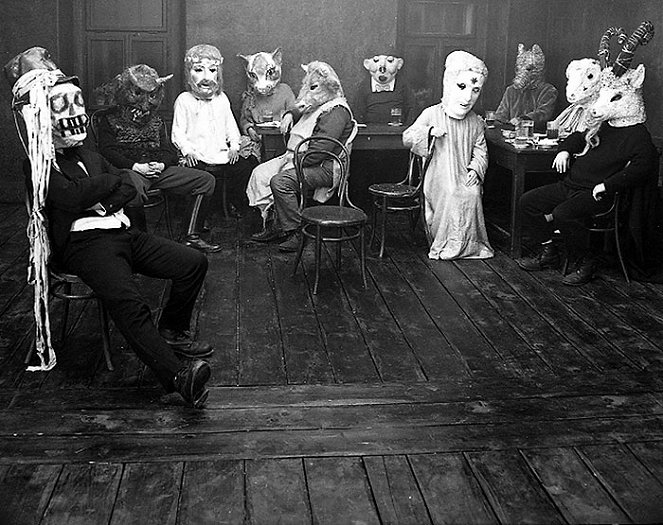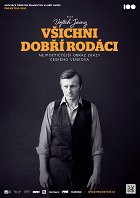Réalisation:
Vojtěch JasnýScénario:
Vojtěch JasnýPhotographie:
Jaroslav KučeraMusique:
Svatopluk HavelkaActeurs·trices:
Vlastimil Brodský, Radoslav Brzobohatý, Vladimír Menšík, Waldemar Matuška, Drahomíra Hofmanová, Pavel Pavlovský, Václav Babka, Josef Hlinomaz (plus)Résumés(1)
Mai 1945. Dans l'euphorie de la Libération, la vie quotidienne d'un petit village morave respire l'harmonie, la franche camaraderie et la gaité. Mais les temps changent... En février 1948, les communistes prennent le pouvoir. Il faut choisir son camp. Arrivent les expropriations, les procès d'intentions, les arrestations. L'amitié disparaît. (Malavida)
(plus)Critiques (8)
Une véritable perle du cinéma tchécoslovaque. L’image d’un village tchèque après 1945, de grands acteurs tchèques, des prises de vue époustouflantes de beauté, une poétique inégalée et une histoire puissante. Un must pour tous les cinéphiles, bien que ça dépende des sensibilités de chacun. Je veux bien croire que Vojtěch Jasný a filmé six heures de prises brutes sur lesquelles il a dû ensuite sérieusement travailler au cours du montage.
()
Unquestionably the best film by Vojtěch Jasný and probably the best film dedicated to the subject of collectivization of the Czech countryside. Jasný filmed it after several years because the script could not pass the contemporary censorship for understandable reasons. It was only during the period of reforms in the late 60s and Dubček's intervention that it finally succeeded. The film shows the creative affinity between Vojtěch Jasný and another significant Czech director, Karel Kachyňa. It is similarly poetic, with a focus on visual composition, and a careful selection of actors and their direction. It is interesting that even though the film does not delve deep into the bleak conditions of the 50s, because the political persecution and societal atmosphere were actually worse, there has not been a film made in today's free creative conditions that could surpass or even come close to this one... Overall impression: 95%.
()
It is not so much the uncontrolled recklessness of nationalization, but rather the concentrated nature of the little Czech man in the form of a Beskydy village that becomes the subject of criticism (but also celebration) in this epic fresco by Jasný. A third of the way through it takes away your words, then your breath, and finally, your superlatives. I have never experienced such huge applause from such a small number of people in the movie theater.
()
All My Compatriots is a pretty demanding and hard-to-stomach movie not only for Czechs, but for everybody in general. That being said, it will definitely have a stronger impact on a Czech. The most important thing about the movie is the sad story, which the authors kept working on for twenty years, so I can be sure that there is no nonsense in the movie, only hard reality, which is something I rarely want to see in movies, but which comes in handy if you want to form an opinion of the times. And not only about the times, I would go as far as to say that the way the compatriots were treating one another isn’t that much different from how people treat each other in Czech villages these days. It’s enough for an essential problem to appear and it splits the nation in twain and we’re at it again, just like we saw during the last presidential election. What I appreciate about All MyCompatriots is the raw reality, the way it shines a light on the Czech nature, which is something you get to see quite often in Czech cinema, but nowhere as raw as here. All the actors put in the best performances of their careers, but despite that, what I had the greatest problem with was how cumbersome the movie is. It was really hard to watch for me, so scenes would simply go on and on forever. And that’s why I cannot give this demanding self-reflection on the Czech people a five-star review.
()
The following text translates from Czech to English:
A classic that I have been afraid of for a very long time (and completely unnecessarily). There is no celebration of the rural spirit of life. It is only the honesty of how sometimes stubbornness that is completely different from before benefits people, and it surprisingly evokes a sad expression on the viewer's face. Thanks to the archetypal characters of the imposing František or the bohemian Zášinek, Vojtěch Jasný goes strongly to the heart of the matter and is not hindered by a few unnecessarily falling parables.
()
Photos (27)
Photo © Filmové studio Barrandov / Jaromír Komárek


Annonces